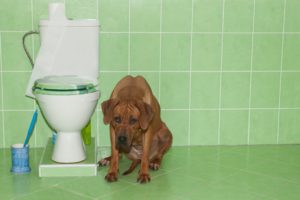As parents, we don’t leave items around the house that are unsafe for kids, right? Well that same rule of thumb should apply to your pets. Many common items that are sometimes overlooked in homes have proven to be a problem if ingested by your pet.
Take a look at this list of the top eight household dangers to pets and be sure to keep these items well out of paws’ reach to protect your pets.
#8 Chocolate
Like most humans, pets find chocolate hard to resist. Dogs are much more likely to find and eat chocolate, but cats are just as sensitive to the toxins in chocolate and some cats will eat it if they find it.
If your pet ingests enough chocolate to show any of the following symptoms, you should seek immediate veterinary assistance.
Symptoms of chocolate poisoning:
- Stomach upset
- Pancreatitis
- Hyperactivity
- Elevated heart rate
- Tremor
- Seizures
#7 Over-the-counter Pain Relievers
Most of us keep medicine in a cabinet but you’d be surprised how many pets get themselves into pills and other stuff meant for humans such as ibuprofen and naproxen.
Pets metabolize and eliminate these drugs differently than humans so even small amounts if swallowed, can cause significant medical problems in dogs.
Ibuprofen, naproxen, acetaminophen and aspirin can all cause life-threatening symptoms in pets.
- Ibuprofen & Naproxen = stomach ulcers & kidney failure
- Acetaminophen = liver damage & damage to red blood cells
- Aspirin = liver damage, stomach ulcers & fever
- Cats and ferrets are especially sensitive to these pain relievers but all pets are at risk, so take the same precautions with your pets that you do with pills and kids.
#6 Laundry Detergent
Laundry detergents unfortunately tend not to be handled or regarded with the same caution as other household toxins though they are extremely dangerous to both kids and pets.
Laundry detergent containers can be easily tipped over or chewed through by your dog(s). Pets who lick laundry detergent off of themselves or the floor can develop an upset stomach and/or upper airway irritation and pets who inhale detergent into their lungs can develop aspiration pneumonia.
Laundry detergent pods have been in the news recently for causing poisonings in children attracted to their bright, candy-like packaging. Like with kids, laundry pods can seem like potential food items or toys to pets.
One of the reasons detergent pods are proving so harmful is that the detergent in them is more concentrated than in bottled forms.
Since the pods are meant to dissolve in water, saliva can lead to a release of the contents even if the pet hasn’t actually bitten through the packaging. Dry pods do not pop easily just by squeezing, but once a pod is wet by water or saliva, the contents can readily ooze out.
Secure all laundry detergent in a place where your dog or cat cannot find or reach them and keep in mind your cat can jump!
Note: fabric softeners are also dangerous to pets because they contain cationic detergents that have the potential to cause symptoms like drooling, vomiting, oral and esophageal ulcers and fever. Oral ulcers can develop if a pet chews on a new, unused dryer sheet. Used sheets contain minimal amounts of detergent.
#5 Sugar-Free Gum
Sugar-free gum containing Xylitol can cause a lowering of or a sharp drop in a pet’s blood sugar resulting in depression, loss of coordination and seizures; in some cases, even liver damage. Be sure to keep sugar free gum away from a dog’s ever-curious nose because dogs, even cats, can easily open a pack of gum with their teeth.
Xylitol is also in some human breath fresheners, so do not try to cure a dog’s bad breath by giving him/her a human mint or breath freshener. Breath strips that contain menthol can be irritating to the tissues of the pet’s mouth and gastrointestinal tract.
Xylitol can also be found in a number of other foods and medications so always check labels before offering your dog part of what you are eating.
#4 Drain Cleaner
Drain cleaner is a very dangerous, possibly lethal, chemical when it comes to people and pets. It has a very high pH and can cause corrosive burns to the mouth and esophagus.
Store all drain cleaners in a childproofed cabinet and if you are using drain cleaner, make sure that all pets are kept out of the room until it is cleared and thoroughly rinsed.
Drain cleaner is especially dangerous for curious cats who jump into cabinets and sinks. They will often walk through the drain cleaner and then lick it off of their paws.
When you are done using a drain cleaner, dispose of the used bottle outside where a pet cannot come in contact with it.
#3 Essential Oil Diffusers
The popularity of burning or diffusing essential oils has sky-rocketed in the past few years. There are many health benefits for humans and who doesn’t like their house smelling nice? But pet owners should be extremely cautious about these scents. In a recent, viral Facebook post, one owner described her own scary ordeal with Tea Tree Oil poisoning her puppy.
After burning a new defuser for a few days, she noticed her dog was acting strange. He didn’t recognize her and hid under the bed. Thankfully, a visit to the emergency vet saved his life. There are many essential oils that are toxic to pets. Pet Poison Helpline lists four oils that are extremely dangerous:
- Tea Tree Oil – causes depression, ataxia, paralysis of rear legs, vomiting, hypothermia, and irritated skin.
- Pennyroyal – also known as squaw mint and causes liver failure; vomiting, diarrhea, lethargy, and death.
- Oil of Wintergreen – it contains aspirin, which can lead to ulcers, renal failure, and liver failure
- Pine Oils – cause skin irritation, stomach upset, vomiting that can be bloody, drooling, weakness, ataxia, and harmful effects to the nervous system
The best thing to do is discuss essential oil use with your veterinarian. There are some oils that are safe for pets but it’s better to err on the side of caution. Stay educated on what you can and can’t use with pets.
#2 Antifreeze
Antifreeze poisoning is one of the most common forms of poisoning in small animals because it is so commonly found in households. It is the toxin ethylene glycol contained in antifreeze that makes it so lethal.
Antifreeze poisoning typically happens when antifreeze drips from a car’s radiator and is licked off the ground and ingested by a pet. Take care not to spill antifreeze, and if it is spilled, ensure that it is immediately and thoroughly cleaned-up.
Some homeowners add antifreeze to their toilets during cold months to “winterize” their pipes: dogs and even cats come in contact with the substance this way too.
Antifreeze (until recently) had a pleasing, sweet taste so dogs would consume great quantities of ethylene glycol before being repulsed by its aftertaste. By then, it is too late.
It does not take a significant amount of ethylene glycol to cause fatal damage to the system; less than three ounces (or 88 ml) of antifreeze is sufficient to poison a medium-sized dog. Antifreeze poisoning affects the brain, liver, and kidneys.
Dogs that have consumed antifreeze in a very small quantity may survive, but will develop kidney failure within days of ingestion. Unfortunately, death due to kidney damage is common among animals that have been poisoned by antifreeze.
Manufacturers are now making antifreeze taste awful by adding bittering agents to ethylene glycol products. Despite this, you should keep antifreeze containers tightly closed and stored out of the reach of pets and dispose of used antifreeze containers outside in a place where pets or any other animal cannot find or come in contact with them.
#1 Mosquito Repellent
Do not share bug repellant with your pets; in fact, never use any product on pets that are not specifically made for animals.
Certain mosquito repellents that are made for human beings contain DEET (N, N-diethyl-meta-toluamide). The use of DEET on pets is not recommended, as dogs and cats are very sensitive to it and may develop neurological problems such as tremors, seizures, and even death if the product is used on them.
If you want to keep mosquitoes away from your pets, ask your veterinarian for an appropriate product.
If you suspect your pet has been exposed to any poisonous substances, contact your veterinarian or call Animal Poison Control Center at 888-426-4435 immediately.



